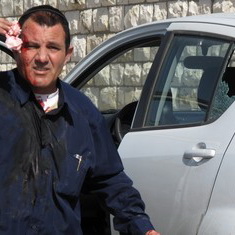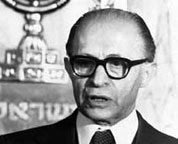Police delay opening station at the cemetery.
Photo By Marc Kahlberg
Marc Kahlberg, a 10-year police veteran who created and headed the Netanya Tourist Police and served as police spokesman during the Gaza disengagement, was at the cemetery with a group of American visitors on Monday when he heard glass shatter. He turned around to see two people wearing kippot drive up in a car that had just been heavily stoned by a group of Arab residents further up the road.
The driver was wounded and bloody from broken glass, and the passenger was in shock, Kahlberg said.
He condemned the security situation in the area, where stonings of Jewish vehicles leaving and entering the Temple Mount are so frequent that police no longer report them to the public.
“Something should be done. We need a tough hand,” Kahlberg said on Tuesday. “These were not little stones, they do a lot of damage, and they can kill.”
He added that the authorities should begin classifying all stone-throwing episodes as terror attacks. “That’s attempted murder,” he said.
At the end of January, Public Security Minister Yitzhak Aharonovitch announced that the Jerusalem Police would open a new police station atop the Mount of Olives. The station was originally slated to open this week, but it will be delayed for an unspecified amount of time, said Jerusalem Police spokesman Shmuel Ben-Ruby on Tuesday.
Twenty-five police officers will be stationed on the Mount of Olives to guard against desecration of graves and to prevent stone-throwing incidents.
Ben-Ruby defended police action in the area.
“The Jerusalem Police have regular patrols in the area to ensure the security of visitors there,” he said in response to Kahlberg’s complaint, adding, “In the near future, we will establish a police station in the area, which will seriously improve the security situation in the area.”
The Mount of Olives cemetery has been used as a Jewish cemetery for more than 3,000 years and holds approximately 150,000 graves, including those of former prime minister Menachem Begin and Rabbi Avraham Yitzhak Kook, according to the International Committee for the Preservation of Har Hazeitim.




